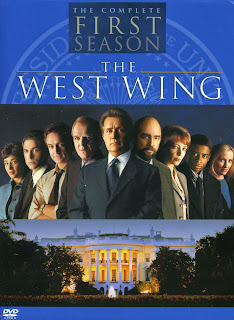The characters are great, the pace is fast, and the wisecrack-laden dialogue fizzes in a way that reminds me of His Girl Friday. Whenever they aren’t batting one-liners to and fro like tennis pros, the cast sum up the defects of each other’s characters in the sort of set-piece speech which American screenwriters do so well. It’s fabulous. But I can see why I turned up my nose at it all those years ago. There’s a certain amount of cynicism displayed by the aides and press officers who make up most of the cast, but the president, played by Martin Sheen, is presented as a secular saint, and about once an episode it all goes a bit soft focus and stirring music swells on the soundtrack while someone explains that America is a Beautiful Idea, or some such patriotic guff. I know that sort of thing plays well in the U.S, and not just with the right (The West Wing is achingly liberal). Over here, for some reason, we find it a bit embarrassing. It's hard to imagine a British Prime Minister being portrayed with such reverence.
A good example of the British view of politicians is House of Cards (1990). Based on the novel by Michael Dobbs MP, it tells the story of Francis Urqhart, a loyal Conservative chief whip who, when the new Prime Minister goes back on a promise to make him Foreign Secretary, accepts the snub with apparent good grace, and then calmly and coldly sets about wreaking his revenge. It’s now been remade by Netflix in the US, with the action moved to Capitol Hill and Kevin Spacey in the role made famous by Ian Richardson (he’s called Francis Underwood in the new version).
The remake is a class act, it really is; Spacey is supremely watchable, and I enjoyed seeing him plot and scheme his way through a Washington DC which seems to have been drained of all its warmer hues, an underlit, almost submarine city of marble and brushed steel, haunted by a wintry soundtrack. But it never achieves the real cruelty of the old BBC version, which was one of the most irredeemably black-hearted TV shows I’ve ever seen. The new House of Cards has more episodes to fill, and an eye on further seasons. It can’t help humanising its anti-hero.
Also, it’s less theatrical than the original. Spacey keeps up Ian Richardson’s trick of addressing the camera as a co-conspirator, but the story seems to be trying harder to be plausible, and, as a consequence, it’s much less so - the melodramatic plot twists ring false. Added to which, as the second season wore on, I found it harder and harder to keep track of who was plotting to do what to whom, and why, and why I should care.
Worst of all, somewhere beneath the Apple-advert sheen I think there may lurk the same hope that lights The West Wing - Frank Underwood might be a wrong ‘un, but America is still a Beautiful Idea. They seem to think his resistible rise is a tragedy, when it should be a black comedy. I’ll keep watching, but I’m not convinced.
Michael J Fox is in it, playing a wonderful devious scoundrel, as is Alan Cumming, who gives the prissiest performance this side of C3PO as the political advisor fighting to rebuild hubby’s career. Zach Grenier crops up as a sly, reptilian divorce lawyer, the great Stockard Channing arrives in a later season as our heroine’s prodigal mother, and Carrie Preston is a hoot as the ditzy but brilliant Elsbeth Tascione. Archie Panjabi (from Bend It Like Beckham, another ER alumnus) is cool and charismatic as the law firm’s investigator, but the show doesn’t seem to know quite how to handle her - her storylines keep skittering off into ludicrous melodrama.
But The Good Wife is good enough to cope with a bit of ludicrous melodrama - there’s so much going on, and you never know whether you’re in for a comic turn, a serious chin-stroking moment about some case clunkingly based on a real-life incident, or total soap opera lunacy. It’s all over the place - the plot doesn’t just twist, it makes U-turns, generally in an effort to avoid colliding with other plots which appear suddenly out of left field - but somehow it just works. I’m including it this round-up because it’s at least partly about politics, with Peter Florrick campaigning to get elected again as DA and then as state governor. I can’t tell if the writers of The Good Wife think America is a Beautiful Idea or not, but their version of American politics is a giddy parade of attack ads, leaked e-mails, sleaze, deviousness, backstabbing, and downright lies. I know I’m not comparing like with like, but it feels far more believable than House of Cards.




Really enjoyed this. Envy your forthcoming West Wing watching. I agree about House of Cards ... the second season lost me bUT my son tells me I must persevere!
ReplyDeleteI really enjoyed Netflix's House of Cards, haven't watched the others though. The second season does seem to be a bit draining. I might give them a try now.
ReplyDeleteI'd highly recommend the BBC 'House of Cards'. It's so different from the Netflix version that it's almost unfair to compare them, and I guess the Conservative party it describes is fading into history now (it was first broadcast when Margaret Thatcher was still in charge) but it's still very good. And only four episodes. (There are sequels, but I don't remember them being so good.)
ReplyDelete